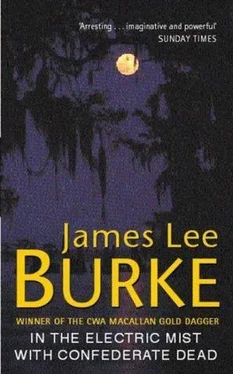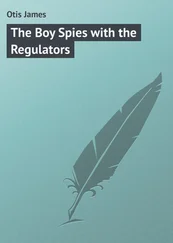Others had helped her get there. My first vote would be for the father, the child molester, in Mamou. But our legal system looks at nouns, seldom at adverbs.
I gazed at the spreading oaks in the church's graveyard, where Evangeline and her lover Gabriel were buried. The tombstones were stained with lichen and looked cool and gray in the shade. Beyond the trees, the sun reflected off Bayou Teche like a yellow flame.
Where was the boyfriend in this? I thought. A girl that pretty either has a beau or there is somebody in her life who would like to be one. She hadn't gone far in school, but necessity must have given her a survivor's instinct about people, about men in particular, certainly about the variety who drifted in and out of a south Louisiana jukejoint.
She had to know her killer. I was convinced of that.
I walked to the bar, a ramshackle nineteenth-century wooden building with scaling paint and a sagging upstairs gallery. The inside was dark and cool and almost deserted. A fat black woman was scrubbing the front windows with a brush and a bucket of soap and water. I walked the length of the bar to the small office in back where I had found the owner before. Along the counter in front of the bar's mirror were rows upon rows of bottles-dark green and slender, stoppered with wet corks; obsidian black with arterial-red wax seals; frosted-white, like ice sawed out of a lake; whiskey-brown, singing with heat and light.
The smell of the green sawdust on the floor, the wood-handled beer taps dripping through an aluminum grate, the Collins mix and the bowls of cherries and sliced limes and oranges, they were only the stuff of memory, I told myself, swallowing. They belong to your Higher Power now. Just like an old girlfriend who winks at you on the street one day, I thought. You already gave her up. You just walk on by. It's that easy.
But you don't think about it, you don't think about it, you don't think about it.
The owner was a preoccupied man who combed his black hair straight back on his narrow head and kept his comb clipped inside his shirt pocket. The receipts and whiskey invoices on his desk were a magnet for his eyes. My questions couldn't compete. He kept running his tongue behind his teeth while I talked.
"So you didn't know anything about her friends?" I said.
"No, sir. She was here three weeks. They come and they go. That's the way it is. I don't know what else to tell you."
"Do you know anything about your bartenders?"
His eyes focused on a spot inside his cigarette smoke.
"I'm not understanding you," he said.
"Do you hire a bartender who hangs around with ex-cons or who's in a lot of debt? I suspect you probably don't. Those are the kind of guys who set up their friends with free doubles or make change out of an open drawer without ringing up the sale, aren't they?"
"What's your point?"
"Did you know she had been arrested for prostitution?"
"I didn't know that."
"You hired her because you thought she was an honor student at USL?"
The corner of his mouth wrinkled slightly with the beginnings of a smile. He stirred the ashes in the ashtray with the tip of his cigarette.
"I'll leave you my card and a thought, Mr. Trajan. One way or another we're going to nail the guy who killed her. In the meantime, if he kills somebody else and I find out that you held back information on me, I'll be back with a warrant for your arrest."
"I don't care for the way you're talking to me."
I left his office without replying and walked back down the length of the bar. The black woman was now outside, washing the front window. She put down her scrub brush, flung the whole bucket of soapy water on the glass, then began rinsing it off with a hose. Her skin was the color of burnt brick, her eyes turquoise, her breasts sagging like water-filled balloons inside her cotton-print dress. I opened my badge in my palm.
"Did you know the white girl Cherry LeBlanc?" I asked.
"She worked here, ain't she?" She squinted her eyes against the water spray bouncing off the glass.
"Do you know if she had a boyfriend, tante?”
"If that's what you want to call it."
"What do you mean?" I asked, already knowing the answer that I didn't want to hear.
"She in the bidness."
"Full time, in a serious way?"
"What you call sellin' out of your pants?"
"Was Mr. Trajan involved?"
"Ax him."
"I don't think he was, otherwise you wouldn't be telling me these things, tante." I smiled at her.
She began refilling the bucket with clear water. She suddenly looked tired.
"She a sad girl," she said. She wiped the perspiration off her round face with her palm and looked at it. "I tole her they ain't no amount of money gonna he'p her when some man make her sick, no. I tole her a pretty white girl like her can have anything she want-school, car, a husband wit' a job on them oil rig. When that girl dress up, she look like a movie star. She say, 'Jennifer, some people is suppose' to have only what other people let them have.' Lord God, her age and white and believing somet'ing like that."
"Who was her pimp, Jennifer?"
"They come here for her."
"Who?"
"The mens. When they want her. They come here and take her home."
"Do you know who they were, their names?"
"Them kind ain't got no names. They just drive their car up when she get off work and that po' girl get in."
"I see. All right, Jennifer, this is my card with my telephone number on it. Would you call me if you remember anything else that might help me?"
"I don't be knowin' anything else, me. She wasn't goin' to give the name of some rich white man to an old nigger."
"What white man?"
"That's what I tellin' you. I don't know, me."
"I'm sorry, I don't understand what you're saying."
"You don't understand English, you? Where you from? She say they a rich white man maybe gonna get her out of sellin' jellyroll. She say that the last time I seen her, right befo' somebody do them awful t'ings to that young girl. Mister, when they in the bidness, every man got a sweet word in his mouth, every man got a special way to keep jellyroll in his bed and the dollar in his pocket."
She threw the bucket of clear water on the glass, splashing both of us, then walked heavily with her brushes, cleaning rags, and empty bucket down the alley next to the bar.
The rain fell through the canopy of oaks as I drove down the dirt road along the bayou toward my house. During the summer it rains almost every afternoon in southern Louisiana. From my gallery, around three o'clock, you could watch the clouds build as high and dark as mountains out on the Gulf, then within minutes the barometer would drop, the air would suddenly turn cool and smell like ozone and gun metal and fish spawning, the wind would begin to blow out of the south and straighten the moss on the dead cypress trees in the marsh, bend the cattails in the bayou, and swell and ruffle the pecan trees in my front yard; then a sheet of gray rain would move out of the marsh, across the floating islands of purple hyacinths in the bayou, my bait shop and the canvas awning over my boat-rental dock, and ring as loud on my gallery as marbles bouncing on corrugated tin.
I parked the truck under the pecan trees and ran up the incline to the front steps. My father, a trapper and oil-field roughneck who worked high on the derrick, on what they called the monkey board, built the house of cypress and oak back in the Depression. The planks in the walls and floors were notched and joined with wooden pegs. You couldn't shove a playing card in a seam. With age the wood had weathered almost black. I think rifle balls would have bounced off it.
My wife's car was gone, but through the screen door I could smell shrimp on the stove. I looked for Alafair, my adopted daughter, but didn't see her either. Then I saw that the horse lot and shed were empty and Alafair's three-legged coon, Tripod, was not in his cage on top of the rabbit hutches or on the chain that allowed him to run along a clothesline between two tree trunks.
Читать дальше












